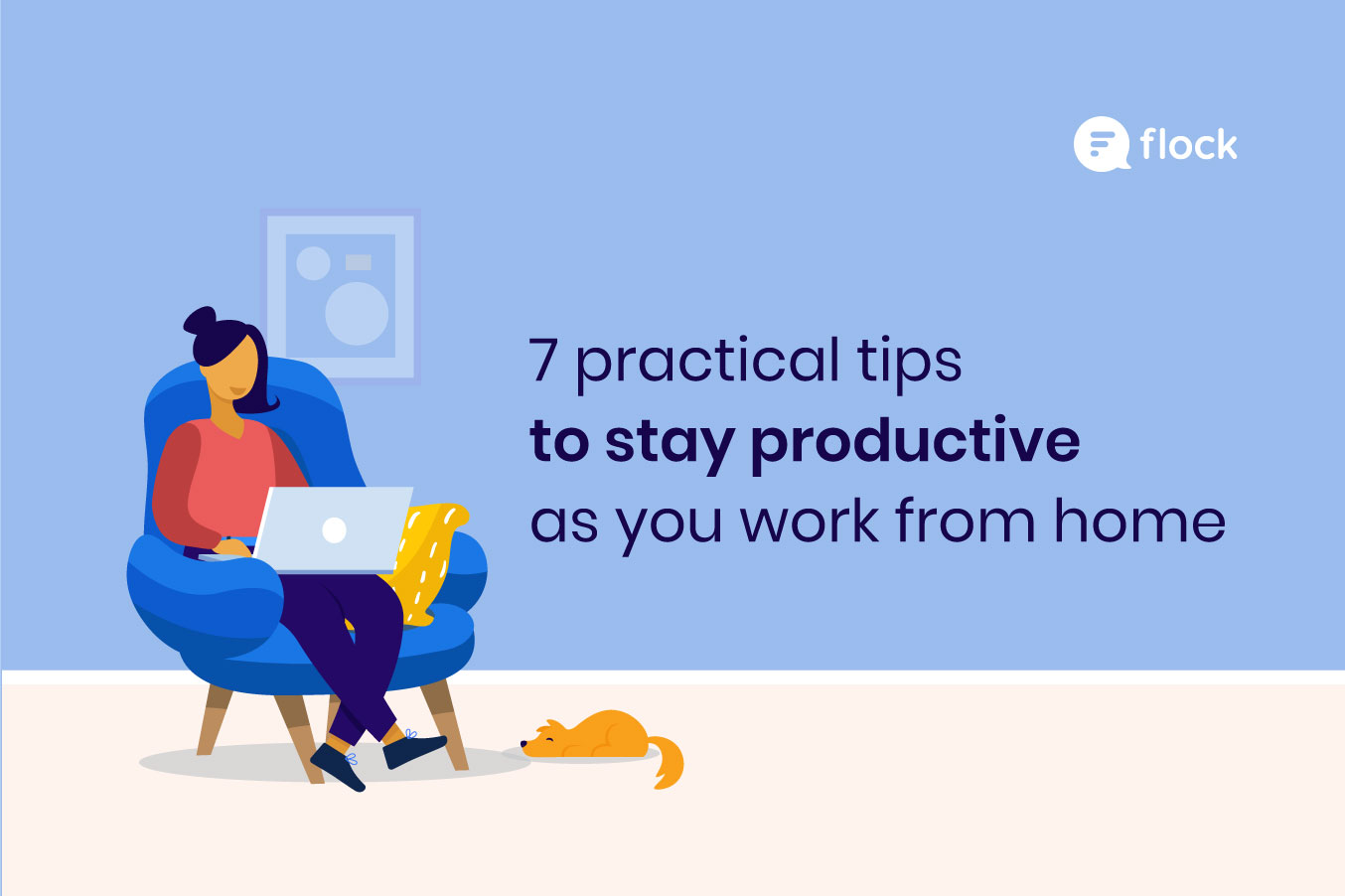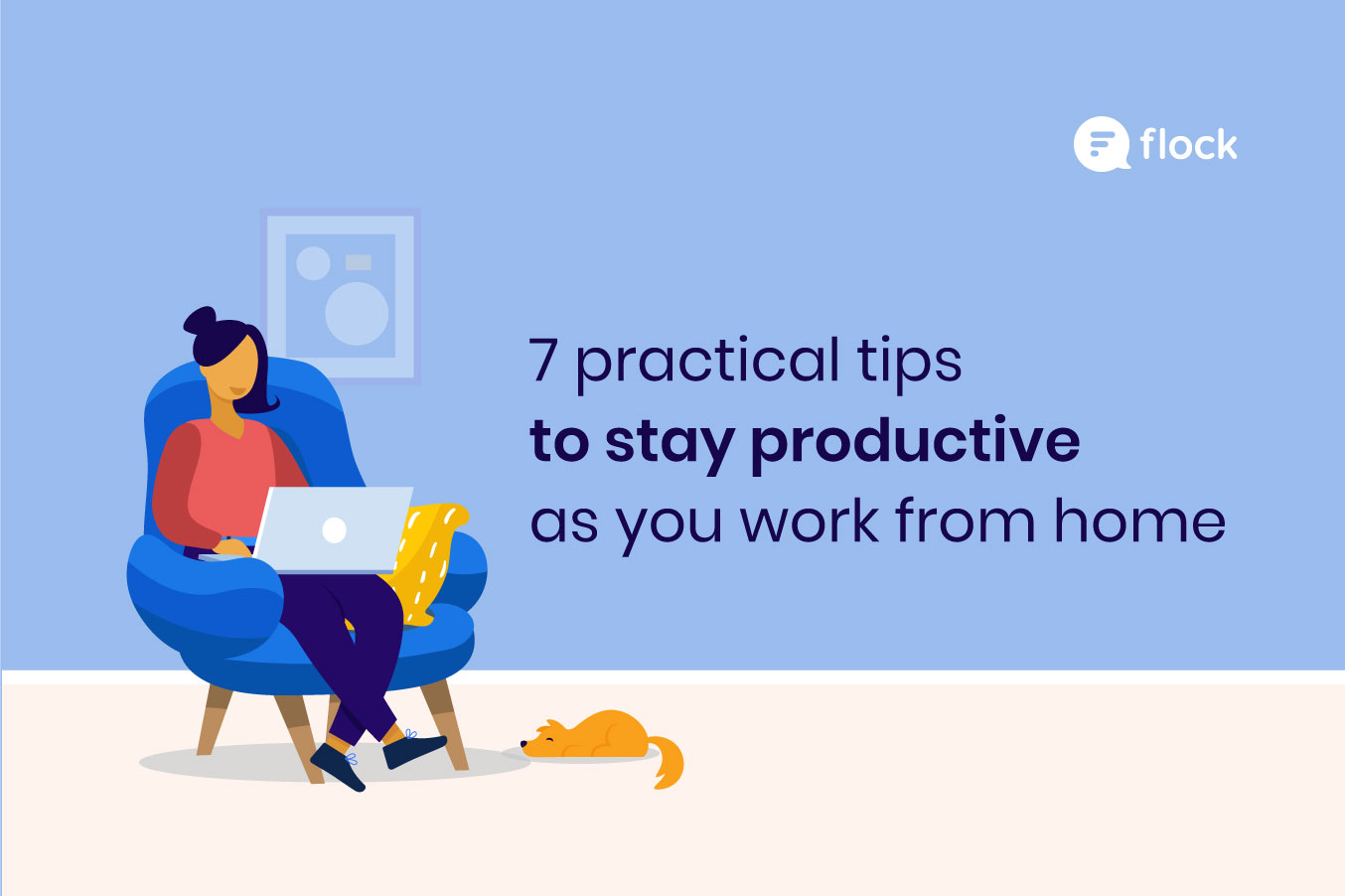
At Flock, productivity is always on our minds—perhaps more so now as we work from home. Our transition from being a distributed but mostly co-located team to a fully remote workforce was reasonably smooth, but we’ve all been concerned about both personal and team productivity. After all, we went from having nine hours of dedicated time in the office each day to spending all day juggling work and household chores with no clear line of separation. Add in pets and/or kids (and their education!), and it’s easy to see how work gets derailed as we try to do it all.
So we did what we do best, we flocked to talk about it. Our HR superstars jumped in to organize Flock Forward, a series of internal panel discussions on various topics of interest, and the first one was all about work from home productivity. Some of those tips, we felt, would be useful across teams, mostly ones focused on improving day-to-day productivity.
From establishing a routine and organizing tasks to blocking distractions and even taking a nap, here are 7 practical tips from our Flockstars to help you get things done.
7 practical tips to stay productive as you work from home
-
Establish a daily routine

Some of my co-workers can roll out of the bed and start working, while others like to take care of household chores before they start work. What works for one doesn’t work for everyone. ;) For managers, this means allowing your team flexible work hours to accommodate varying employee schedules and working styles.
Your daily routine can vary according to personal preferences and business needs, but it’s important to have one in the first place. Establishing a daily routine provides structure to your day and makes it easier to get things done.
Start by establishing a clear start time as well as a hard stop to work-related tasks. Block chunks of time each day for household chores, family commitments, work assignments, and personal tasks with breaks to unwind. Working from home isn’t too different from working in general, and a daily routine helps you better manage your time and energy. -
Jot things down to stay organized

As David Rock writes in Your Brain at Work, the brain is a stage. The stage is small and only a few actors can stay on it at a time, but you still need the remaining actors nearby. Otherwise, it will be difficult to get them on to the stage quickly when required. Overcrowd the stage and the play—your work—suffers. Write everything you need to do today into a list, so you can focus on one thing at a time. No more reminding yourself of every little task or worse, trying to split your focus and “multitask.”
Once you jot down what you need to do, organize them into personal and work buckets. Prioritize tasks as needed, and throw in a few personal commitments like cooking lunch, family time, or even cleaning up as breaks between work. Having a clear set of to-dos makes it easy to stay on track and get things done. Plus, the change of pace between a work meeting and TV time with family might be just what you need to relax and refresh. -
Prioritize collaboration tasks in overlap hours
Overlap hours, where all co-workers are online and available, are a precious commodity for any remote team. Keep this in mind when prioritizing your work tasks each day. Group them into categories such as planned meetings (team standups, project check-ins, 1:1s, etc.), collaborations (brainstorming sessions, design reviews, etc.), and focused work (for tasks you accomplish in an individual capacity).
Planned meetings will take up a chunk of your team’s overlap hours, but this is also the time for collaborations—so you can tackle tasks that require a coworker’s real-time assistance. Schedule tasks that you can accomplish by yourself—the focused work category we talked about—around team overlap hours so you accomplish everything on your to-do list more efficiently.
-
Take a nap, but don’t be a couch potato
 All that work tiring you out? Get some shut-eye. Not at the expense of falling behind on work, of course, but even a 20-minute power nap between tasks can significantly increase mental alertness and rejuvenate your body’s energy levels. Plus, who doesn’t like to nap? One in three people working from home admit to napping at work, so you might as well follow the New York Times’ sage advice: “Take naps at work. Apologize to no one.”
All that work tiring you out? Get some shut-eye. Not at the expense of falling behind on work, of course, but even a 20-minute power nap between tasks can significantly increase mental alertness and rejuvenate your body’s energy levels. Plus, who doesn’t like to nap? One in three people working from home admit to napping at work, so you might as well follow the New York Times’ sage advice: “Take naps at work. Apologize to no one.”
The other thing to keep in mind when working from home: you’ll lose track of time hunched over your laptop when you’re being particularly productive far more often than in the office. With colleagues around, we get visual reminders to take a break when they do, so we move away from our workstations, and maybe walk ourselves downstairs to brew a cup of coffee or three. At home, most of us are likely to not get even that little amount of physical activity each day. Manage this by setting a reminder to get up and stretch your legs every hour. Maybe take your pet out for a walk or play with the kids? A little physical activity can curtail many negative health effects of our sedentary lifestyles . Additionally, consider incorporating healthy habits that can support your energy levels throughout the day. This could include a well-balanced diet, proper hydration, or even exploring the potential benefits of a greens powder supplement to boost your intake of essential vitamins and minerals. -
Block distractions with DND
Working from home can be fun, but it’s also easy to get distracted. Setting yourself up in a quiet corner of the house or a decent home office is a good idea, but it’s equally important to mute alerts from your phone and communication apps. Notifications are a real productivity killer, especially when one is sitting at home and subconsciously wondering what our friends are up to. Every ping rings in our minds, FOMO strikes soon enough, and work gets interrupted. Research shows that the average employee is interrupted every 6-12 minutes and takes up to 25 minutes (and more sometimes) to resume a task after being interrupted. The solution? DND (Do Not Disturb).
Set your phone to silent, mute desktop notifications, and set Flock to DND whenever you need to focus on a task. Using DND also lets coworkers know they shouldn’t expect an immediate response. All those messages piling up? Use them to break the monotony of deep work—throw in small breaks throughout the day to check for new messages as you grab a cup of coffee or stretch your legs. Further, set aside blocks of time for ad hoc discussions and freewheeling conversations—in Flock or otherwise. Managers: lead by example, using DND when required, and encourage team members to do the same.
-
Set a hard stop for work
Your daily routine should always have a hard stop for work, just like you would if you were commuting to the office. Set a specific time to shut down your workstation and mute all notifications so you can spend time with family, focus on self-care, or just unwind from a long day at work.
Don’t be too hard on yourself when an occasional task remains unfinished, move it up your priority list for the next day. Instead, establish an end-of-work routine to signal your brain that it’s time to unwind and make sure your team implements similar routines to encourage work-life balance. -
Talk to your team
Finally, talk to your team when you feel there’s too much on your plate. Check-in with coworkers (cross-functional colleagues, too) on how they’re managing their workload. Compare what you were doing earlier and what you're doing now to figure out where you're losing time or where you're being less productive. Maybe reassigning some tasks will be more efficient? Or maybe you just need a vacation to de-stress? In either case, talking to your team can help.
To maintain productivity while working from home, it is crucial to allocate dedicated time and focus on tasks such as do my programming homework to ensure timely completion.
Leaders—this means fostering an open and collaborative team culture where your employees can freely air concerns and ask for help.








